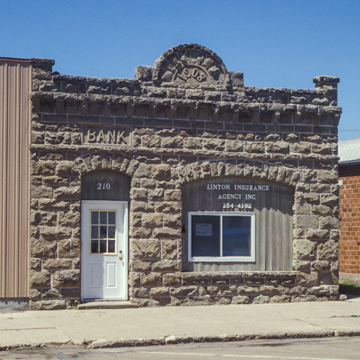Early in the twentieth century, a bed of sedimentary sandstone was quarried for building stone from a site just to the southeast of the present city limits. Most stone buildings in the state use granite or sandstone fieldstones. This anomalous use of indigenous material yields an interesting local palette of dark gray cut stone. At one time, there were as many as eight sandstone buildings anchoring the commercial district. Those that survive on these blocks are the Patterson building (1903), Lynn law office (1905), First National Bank (1908), and the Petrie Store building (1909). Lamentably, the three-story Hogue Stone Hospital, impressively built with Linton sandstone, was demolished c. 2009.
You are here
Commercial Buildings
If SAH Archipedia has been useful to you, please consider supporting it.
SAH Archipedia tells the story of the United States through its buildings, landscapes, and cities. This freely available resource empowers the public with authoritative knowledge that deepens their understanding and appreciation of the built environment. But the Society of Architectural Historians, which created SAH Archipedia with University of Virginia Press, needs your support to maintain the high-caliber research, writing, photography, cartography, editing, design, and programming that make SAH Archipedia a trusted online resource available to all who value the history of place, heritage tourism, and learning.






